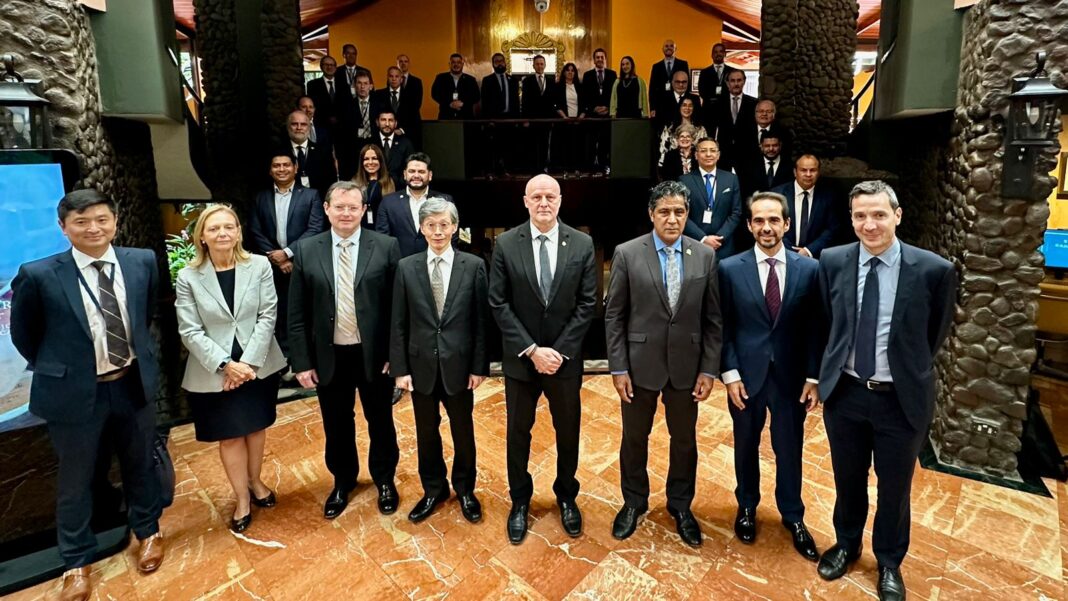Central bank governors, finance ministers, and bank superintendents of Central America, Panama, and the Dominican Republic (CAPDR), and IMF officials met in San Jose, Costa Rica, on July 29-30 to review the regional economic outlook and discuss policy measures needed to tackle key structural issues facing the region. The First Vice-President of the Republic of Costa Rica, Stephan Brunner, and the IMF’s Deputy Managing Director, Kenji Okamura, inaugurated the conference.
At the conclusion of the conference, the following statement was issued by the Director of the IMF’s Western Hemisphere Department, Rodrigo Valdés; and the President of the Central Bank of Costa Rica, and President of the Central American Monetary Council, Róger Madrigal López.
“Participants concurred that the global economy remains resilient, with growth holding steady—projected at 3.2 and 3.3 percent in 2024 and 2025 respectively, but with important divergence across countries and regions—and with inflation gradually returning to target, albeit with slowing momentum. In this context, participants acknowledged that upside risks to inflation have raised the prospects of higher-for-even-longer interest rates, which in turn could increase external, fiscal, and financial risks in the region.
Participants also expressed concerns that medium-term growth prospects in Latin America appear lackluster, especially compared to other major emerging market economies, reflecting continued weak growth of productivity in the region.
“Participants highlighted the strong recent performance of CAPDR, which have outperformed the rest of Latin America and other emerging markets with stronger growth—average real GDP levels in 2024 for CAPDR are projected to be 17 percent higher than pre-pandemic, compared to 9 percent in Latin America and the Caribbean as a whole—and faster convergence to inflation targets. Participants credited these positive outcomes to sound policies aimed at stabilizing public debt and bringing inflation under control, while strengthening social support. Regional growth is projected to remain robust at 3.9 percent in 2024—about double that of the Latin American and Caribbean region—and inflation to continue its downward path. That said, participants noted the challenges posed by tighter global financial conditions on regional debt dynamics and servicing, with adverse implications for infrastructure and social investment. They emphasized the need for policies to boost productivity, including by accelerating public investment, benefitting from new patterns in the global trade system, and addressing structural reform gaps.
“Turning to the thematic sessions, participants assessed income convergence in CAPDR and the factors behind the stark differences in growth across the region. Participants noted that per capita income levels in Costa Rica, the Dominican Republic, and Panama have converged at rates similar to those in East Asia and Eastern Europe, while El Salvador, Guatemala, Honduras, and Nicaragua have seen limited convergence despite solid growth. Participants concurred that these differences can be associated with a combination of complex factors, including the nature of BOP inflows, particularly foreign direct investment versus remittances, factor endowments, domestic markets size, and political stability. As showcased by the experience of Costa Rica, participants underscored the need for policies that attract more foreign direct investment, including reforms to boost productivity and labor force participation, to proactively expand overseas markets and diversify exports, and to strengthen governance and the business climate. They also agreed on the need for more productive use of remittances to support domestic investment.
“In the second thematic session, participants focused on central banks’ monetary and foreign exchange policies and their effectiveness, especially in a context of large dollar inflows amid heightened macroeconomic uncertainty. Participants exchanged views on the experience across the region, including the decisive response by the Central Bank of Costa Rica to the recent price shocks. They also discussed policies to strengthen the role of monetary policy, including the strengthening of the financial sector, development of foreign exchange and domestic debt markets, financial inclusion, interaction with fiscal policy, and proactive communication. Participants shared the view that while foreign exchange interventions can support exchange rate stability in the short term, they are costly and may impede the gradual policy adjustments and market deepening required to absorb higher financial inflows to support long run development.
“The third thematic session analyzed public debt trends in CAPDR and the factors behind higher sovereign financing costs in the region compared to investment-grade emerging markets (EM-IG). Rising public debt in CAPDR alongside increases in sovereign financing costs since the global financial crisis has led to greater increases in interest expenses than in EM-IG. Participants highlighted that public debt and deficits in CAPDR are above those of EM-IG, while revenue collection and governance quality are below those of EM-IG. Although reserves are also below EM-IG levels, it was acknowledged that accumulating more when these are assessed to be at adequate levels could be costly. There was consensus among participants that sound and sustainable fiscal policy frameworks, enhanced revenue mobilization, progress to improve governance, and adequate communication of policy intentions should remain key priorities for policy makers to improve credit ratings and access to international capital markets in more favorable terms.
“Finally, a new IMF book on climate change challenges and opportunities in Latin America and the Caribbean was discussed in the only open session of the conference, which included participants of the civil society and journalists. Participants provided insights on the policy options for climate mitigation, adaptation, and green energy transition, with a shared view that a broad range of mitigation tools is needed, together with comprehensive approaches to adaptation aimed at building structural and financial resilience. Participants emphasized the need for upfront financing from both official and private sector sources, combined with supportive structural reforms, to reach these climate goals.
“Participants thanked the IMF and the Central Bank of Costa Rica for the support provided in the organization of the event and stressed the importance of maintaining a frank and fluid policy dialogue between the region, the IMF and other key stakeholders. Participants expressed their deep appreciation to the Costa Rican authorities for their superb hospitality.” (https://www.imf.org/en/News/Articles/2024/07/30/pr24296-capdr-conclusions-xviii-regional-conference)



































